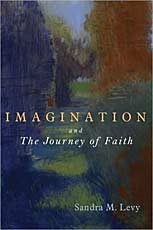Sandra M. Levy is both a clinical psychologist and an Episcopal priest currently serving as priest associate at historic St. John's Church in Richmond, Virginia. In this book she is interested in the role of imagination in the faith journey. Levy offers a definition of this faculty:
"What I mean by imagination here is the inherent human power to transcend the concrete, to create new images and ideas that can open up new possibility and promise — the not-yet of a future we can envision, the re-valuing of a remembered past. Ultimately what I mean by imagination is that human capacity to receive and respond to God's revelation in our everyday lives. I believe it is this human capacity which plays a key role in faith development."
In the first three chapters, Levy explores the various ways in which humans deal with God and set up symbolic meaning in their lives through ritual and music, sacred and secular poetry and visual art, and stories spelled out in plays, films, novels, and Scripture. For the author, the imagination is our path to God. She discovers in the poetry of R.S. Thomas, Wendell Berry, Denise Levertov, and W. H. Auden the "struggle for faith in the midst of anguishing doubts and questions, a hope in a transcendent Presence, and the creation of images in metaphoric language that evokes a sense of the holy in the reader." Levy celebrates the art of Vincent Van Gogh and Lynn Aldrich, novels by Flannery O'Connor and Mark Salzman, the movie The Last Temptation of Christ and Arthur Miller's play The Crucible, and the encounters with God in the Bible.
In Whistling in The Dark, Frederick Buechner states: "Imagining is perhaps as close as humans get to creating something out of nothing the way God is said to. It is a power that to one degree or another everybody can develop, like whistling. Like muscles, it can be strengthened through practice and exercise."
Levy suggests meditative prayer practice, the reading of poetry, the use of Ignatian spiritual exercises, and the sharing of stories as ways in which parents can nurture the imagination of their children at home. She goes on to suggest practices that can be used in communities and churches to exercise the imagination. She concludes with a plea for meaning that respects the life stories of people and the transcendent mystery of God.
